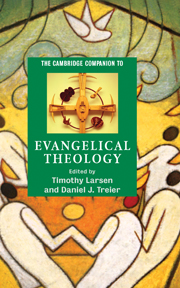Book contents
- Frontmatter
- 1 Defining and locating evangelicalism
- Part I: Evangelicals and Christian doctrine
- Part II: The contexts of evangelical theology
- 10 Evangelical theology and culture
- 11 Evangelical theology and gender
- 12 Race and the experience of death: theologically reappraising American evangelicalism
- 13 Evangelical theology and the religions
- 14 Evangelical theology in African contexts
- 15 Evangelical theology in Asian contexts
- 16 British (and European) evangelical theologies
- 17 Evangelical theology in Latin American contexts
- 18 Evangelical theology in North American contexts
- Index
11 - Evangelical theology and gender
from Part II: - The contexts of evangelical theology
Published online by Cambridge University Press: 28 September 2007
- Frontmatter
- 1 Defining and locating evangelicalism
- Part I: Evangelicals and Christian doctrine
- Part II: The contexts of evangelical theology
- 10 Evangelical theology and culture
- 11 Evangelical theology and gender
- 12 Race and the experience of death: theologically reappraising American evangelicalism
- 13 Evangelical theology and the religions
- 14 Evangelical theology in African contexts
- 15 Evangelical theology in Asian contexts
- 16 British (and European) evangelical theologies
- 17 Evangelical theology in Latin American contexts
- 18 Evangelical theology in North American contexts
- Index
Summary
WHAT IS GENDER?
“Gender” is not an indigenous theological concept but a sociological one. And on its journey into theology it checked in a large amount of baggage which needs to be reclaimed, unpacked, and examined before the concept can be accorded new citizenship. Where this has not happened, the concept's culture and background have been incorporated into new territory, its debates and assumptions unwittingly absorbed, without being fully understood. So our first task is to look at what the concept of “gender” has brought with it from the social sciences and the implications this has for theology.
Sociology's concern with social institutions and processes means the areas of work and family have been significant in the development of the discipline. Inevitably these have involved discussions of the varied societal roles of men and women, including the division of labor. Yet for decades such discussions were somewhat clichéd, based on uncontested stereotypes masquerading as empirical sociological data. The functionalist Talcott Parsons, for example, offered categories which he felt adequately described role differences within the family. He presented the “feminine role” as expressive, fulfilling functions “internal” to the family (strengthening family bonds, socializing children), whilst the “masculine role” was instrumental, performing the “external” functions of a family (provision of monetary support). There was little acknowledgment that such descriptions were, in fact, heavily theoretically loaded and embraced many assumptions waiting to be contested.
- Type
- Chapter
- Information
- The Cambridge Companion to Evangelical Theology , pp. 161 - 176Publisher: Cambridge University PressPrint publication year: 2007

